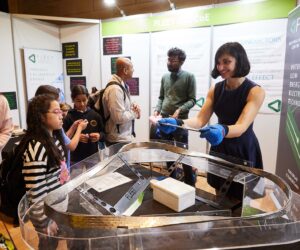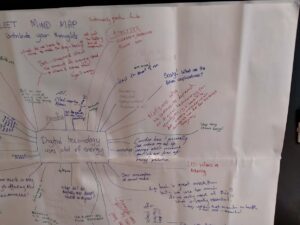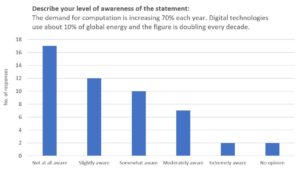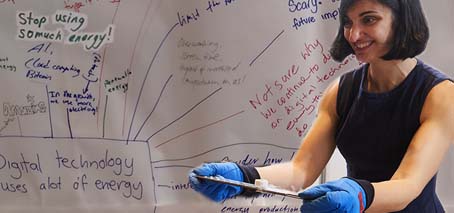Sparking new understanding at the Sydney Science Trail

FLEET’s levitating superconductor always draw the crowds, enabling constructive dialogue about FLEET’s research and research problem: the increasing and unsustainable energy consumption of digital technology. Image: David Swift Photography, Australian Museum
With 1800+ students and members of the public coming through the Sydney Science Trail Expo in 2023, FLEET’s stall was well positioned to engage minds with the Centre’s key mission challenge of unsustainable digital energy consumption.
The levitating superconductor may have been the initial attraction, but the main impact of FLEET’s presence at the 2023 Sydney Science Trail was a shift in public awareness and understanding about how society uses digital technology that led to a call for a socially-responsible digital future.
Alongside learning a bit of quantum physics, our key objective at the event was to engage visitors in constructive dialogue about FLEET’s research problem: the increasing and unsustainable energy consumption of digital technologies.
“If we want technologies to be aligned with our stakeholders’ expectations and values, if the public are to have agency and be empowered to make informed decisions about acceptable ways to solve societal problems, then we need to do more than just tell people about the science,” says FLEET Outreach Coordinator Dr Jason Major.
“Public events such as the Sydney Science Trail are a great opportunity to engage people in critical dialogue about our research and research problem, to begin their process of thinking critically about the problem and facilitate their ability to participate in solutions.”
About 1300 members of the public and 560 students and teachers from 35 schools and home-school networks visited the FLEET exhibit held at the Australian Museum, Sydney.

“Technology isn’t necessary for survival. What do I do digitally that doesn’t need to be digital? What do we have to mine to make the digital technologies – not just the battery, but all components. How much is my job affecting the environment?” Visitors’ thoughts and ideas sparked by the prompt ‘Digital technology uses lots of energy’.
Before visiting the FLEET exhibit, most people had minimal or no awareness of the problem of the energy consumption of digital technology.
Their experience with the FLEET exhibit had a strong impact on their awareness, and indeed understanding, of society’s use of digital technology. Visitors to the exhibit began to think critically about the value we place on digital technology.
When prompted to think about the energy consumption of digital technology, visitors’ ideas for possible solutions fell into one of two different approaches: a perception that technology will underpin any solution to the problem, or a belief that the problem requires socially-focused or cultural solutions.
The ‘tech-fix’ approach included developing and implementing low-energy electronics and using a greater proportion of renewable-energy sources. However, there was a strong concern about the source and use of the materials that would enable new low-energy electronic technologies.
Visitors considering a ‘cultural’ approach called for a shift in how we value digital technology. People began to question their own and society’s reliance on digital technology and which digital technologies have a socially-responsible function versus those that are potentially frivolous or unnecessary.
The emphasis for everyone was a recognised necessity to decrease energy usage and promote a transition towards a more socially-responsible digital future.

A survey conducted before people engaged with FLEET at the Sydney Science Trail show most people had little or no awareness about the high level of energy consumed by digital technology.
Coordinated by the Australian Museum, the Sydney Science Trail Expo is a key part of the Museum’s mission to inspire curiosity and interest in STEM and showcase the Australian science community’s innovations and achievements.
A survey conducted before people engaged with FLEET at the Sydney Science Trail show most people had little or no awareness about the high level of energy consumed by digital technology.
Results from one of the exit survey questions suggests that following their experience with the FLEET exhibit most people had a new perspective about how society uses digital technology.

